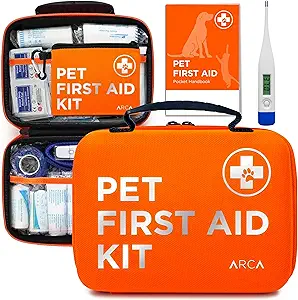Setting Up the Best Home for Your German Shepherd
This post may contain affiliate links, which means I’ll receive a commission if you purchase through my link, at NO EXTRA COST TO YOU
Creating a welcoming and comfortable home for your German Shepherd is essential for their well-being. As one of the most intelligent and energetic breeds, German Shepherds thrive in environments that cater to their needs. In this blog, we will explore the key elements to consider when setting up the best home for your German Shepherd. By understanding these aspects, you can provide a happy and healthy living space for your furry companion.

1. Space Requirements: Room to Roam
First and foremost, consider the space you have available. German Shepherds are large and active dogs that require ample room to move around. Ideally, they thrive in homes with spacious backyards or nearby parks where they can run and play. If you live in an apartment, you can still create a suitable environment by ensuring daily exercise and regular outdoor activities.
Outdoor Space
If you have a backyard, ensure it is securely fenced. A fence provides a safe area for your dog to explore without the risk of wandering off. Moreover, consider adding elements like a shaded area for hot days and a designated spot for play. Additionally, providing toys or obstacles encourages physical and mental stimulation.
Indoor Space
Inside your home, designate an area specifically for your German Shepherd. This space can include a comfortable bed, toys, and water bowls. A designated spot helps your dog feel secure and provides a place to relax after playtime.
2. Comfort: Choose the Right Bedding
Creating a comfortable space for your German Shepherd involves selecting the right bedding. Choose a bed that offers support, as German Shepherds are prone to joint issues. Look for orthopedic beds designed for large breeds. Furthermore, consider placing the bed in a quiet corner of your home, away from distractions. This setup allows your dog to rest peacefully.
3. Feeding Area: Nutrition Matters
Establishing a feeding area is crucial for maintaining your German Shepherd’s health. Select a spot in your kitchen or dining area for their food and water bowls. Ensure these bowls are large enough to accommodate your dog’s size. Moreover, using elevated feeders can promote better posture while eating.
Nutrition
In addition to the feeding area, focus on providing high-quality dog food that meets your German Shepherd’s nutritional needs. Consult your veterinarian for recommendations on the best diet for your dog’s age and activity level.
4. Safety First: Dog-Proofing Your Home
German Shepherds, like all dogs, are naturally curious. Therefore, it’s vital to dog-proof your home to keep your furry friend safe. Start by securing household items that could pose a danger. For instance, keep cleaning supplies and toxic plants out of reach. Furthermore, use baby gates to restrict access to certain areas, especially stairs, when necessary.
Hazardous Items
Pay special attention to small objects that can easily be swallowed, such as toys with small parts. Additionally, ensure your home is free from cords and wires that could pose a choking hazard. By dog-proofing your space, you can create a safer environment for your German Shepherd.
5. Enrichment: Keep Their Minds Active
German Shepherds require mental stimulation in addition to physical exercise. Therefore, to keep their minds sharp, incorporate enrichment activities into your dog’s daily routine. Puzzle toys, treat-dispensing toys, and interactive games provide excellent opportunities for mental engagement.
Daily Activities
Moreover, consider engaging in training sessions. Training not only teaches your dog new commands but also strengthens your bond. Additionally, participating in obedience classes or agility training can further enrich their lives.
6. Socialization: Creating a Friendly Environment
Socialization plays a critical role in your German Shepherd’s development. Ensure your home provides a friendly atmosphere for social interactions. For example, invite friends and family over regularly to expose your dog to new people.
Outdoor Socialization
Furthermore, take your German Shepherd to dog parks or dog-friendly events. These outings allow your dog to meet other dogs and experience various environments. Positive interactions will help your German Shepherd become a well-rounded and confident adult.
7. Exercise: Daily Physical Activity
German Shepherds are active dogs that require regular exercise to maintain their physical and mental health. Aim for at least 60 minutes of vigorous exercise daily. This exercise can include walks, runs, or playtime in the yard.
Activities to Consider
Incorporating various activities, such as fetch, tug-of-war, or agility exercises, helps keep your dog engaged. Additionally, consider joining local clubs or groups focused on dog sports. Engaging in these activities not only promotes exercise but also strengthens your bond with your dog.
8. Grooming: Maintaining Their Coat
Regular grooming is essential for your German Shepherd’s health and comfort. Their thick double coat requires consistent brushing to prevent mats and reduce shedding. Therefore, aim to brush your dog at least once a week, increasing the frequency during shedding seasons.
Grooming Tools
Invest in quality grooming tools, such as a slicker brush and an undercoat rake. These tools effectively manage their coat and keep it looking its best. Additionally, establish a routine that includes bathing, nail trimming, and ear cleaning.
9. Veterinary Care: Regular Check-ups
Lastly, don’t forget the importance of veterinary care. Regular check-ups help ensure your German Shepherd stays healthy. Schedule annual visits to monitor their overall health and discuss any concerns.
Preventive Care
In addition to routine check-ups, stay current on vaccinations and parasite prevention. Keeping your German Shepherd protected will provide peace of mind and contribute to their long-term health.
Conclusion
In conclusion, setting up the best home for your German Shepherd involves careful consideration of their needs. By creating a spacious, comfortable, and safe environment, you will enhance your dog’s quality of life. Furthermore, focus on nutrition, enrichment, and regular exercise to keep your furry friend happy and healthy. Ultimately, with the right setup, your German Shepherd will thrive in your home and bring joy to your family for years to come.









